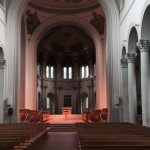
I’m at the Louisiana annual conference where Dr. Elaine Heath is one of our guest presenters. She asked a rhetorical question that was very liberating to me: “What if we were free to fail our way forward?” I know that one of my greatest stumbling blocks in life and ministry is my fear of failure. It sabotages my creativity and my relationships. So what would it look like to have the freedom fail our way forward?
Let me say first that I don’t think Dr. Heath is encouraging us to sit around in our offices and twiddle our thumbs anxiously. You don’t get to call it “failing your way forward” if you’re not trying to do anything. It’s not the same thing as not doing your job and then clucking about God’s grace when your work is unprofessional and sloppy. Likewise, a healthy acceptance of “failure” is not an excuse not to engage in spiritual disciplines that connect us with God. So many clergy fail to ground ourselves spiritually because we’re so busy doing the busy work of ministry. Though God is always gracious, habitually neglecting sufficient time for prayer and communion with God is an unacceptable failure.
When Dr. Heath talks about “failing our way forward,” she’s referring to the way that most of our ministry work is completely contingent upon the buy-in of other people and the intangible chemistry/traction that either does or doesn’t come together. One of the few things that I detest about being a pastor is that it’s a job where my performance is evaluated on the basis of other peoples’ behavior. My “fruitfulness” is measured by how many other people show up. I can do all the right things in terms of publicity and planning, but still end up with a room of mostly empty chairs. And that’s when Satan starts to whisper in my head, “Something isn’t working. I think it’s your lack of charm. People just don’t find you compelling. Are you sure you’re the right person for this job?”
The reality of ministry is that the end results are often dictated by a combination of factors beyond my control. I can do my best and still get terrible results. Sometimes there just isn’t any serendipity in the air at all, and I feel like Murphy’s Law has replaced God as the only certainty in the universe. Additionally, new ministry ideas always have to be tested out and tweaked real-time. Since ministry is always uniquely contextual to the individual community, I can’t pick up a canned outreach program from a megachurch in another town and get the exact same results in my neighborhood. There are no guarantees.
Failing your way forward means refusing to be demoralized when you do your best and the results are disappointing. It means refusing to stop trying. Most importantly, it means constantly straining to listen to the Holy Spirit, understanding that we never hear where the Holy Spirit is leading with perfect clarity. It’s always a bumpy journey in which we think we hear one thing and discover we must have been wrong after banging our head against the wall for a few months.
When I was walking around Tulane’s campus with my prayer beads last summer, I “heard” God tell me to make him a monastery. I continue to be convinced that what Tulane and Loyola students need the most is sacred space where they can rest and receive spiritual nourishment. If their religious life is just another achievement, resume bullet, obligation, service opportunity, or guilt trip, they might as well stick to the secular world and take up yoga instead. Tulane’s campus in particular is filled with burned-out overachievers. They need to have sacred time every week (and preferably every day) in which they are not achieving great accomplishments or acquiring important knowledge but simply sitting in the presence of the still, small voice that tells them they are beloved.
God’s call to me last summer didn’t happen in a vacuum. I had befriended William Thiele, the director of the School for Contemplative Living in New Orleans, and I read his book Monks in the World. Then I discovered Dr. Heath’s book The Mystic Way of Evangelism. This spring, we couldn’t get enough students to go on the annual Guatemala mission trip so we visited the neo-monastic communities Dr. Heath started up in Dallas instead. I’ve started a contemplative worship gathering that meets on Fridays. We have about half a dozen spiritual but not religious students coming to that gathering. I haven’t gotten as much interest from traditional Christian students so far, which I’ve been trying to process.
If the goal of my ministry is to pack out the Wesley building at our Sunday evening contemporary worship services, then this year has definitely been a failure. If the foundation for my decision-making is supposed to be strategic planning about what combination of publicity, sermon topics, worship format, interior decorating, campus presence, etc, will get the most butts in pews on Sunday night, then I’m definitely doing it wrong. There’s part of my brain that follows a completely secular process like that. But there’s another part of my brain which keeps contending that God told me to build a monastery and what I most need to do is fast and pray to listen for further instructions.
To fail my way forward means trusting that God actually has an agenda and that God is actually the one doing the work not only through me but also independent of me. It also means trusting that God is speaking to other people as well, and that I have to listen to them to refine my understanding of what God is telling me. So far I haven’t figured a way to do “monastery” that catches enough traction with a critical mass of students to gel into a cohesive, consistent community. I would love it if we were getting together on campus five times a day to pray the hours like the monks I shared last weekend with. But it seems ridiculous to try to pull people together five times a day when I haven’t been able to convene a consistent crowd once a week. So I continue to explore, test, invite, fail, and learn.
This spring, our board and student leadership had a visioning process facilitated by William Thiele. We created a space for listening to God without immediately jumping into practical, strategic thinking. Out of this visioning process, we identified four concepts that define the identity to which we believe God is calling us: open table, safe spaces, changed lives, transformed world. There’s a “monastery” somewhere in the midst of that. It’s not for everyone, and it can’t be everything that I’m doing. There will be much negotiating, listening, vision-casting, and adapting in the months ahead. I need to be as flexible and ego-less as a leaf riding on the wind of God’s breath. I should not expect everything to click right away. If and when it does click, it will be much more a gift of God’s grace than a predictable outcome of my calculated efforts. When it doesn’t click, I will ask God to show me what to learn and continue to fail my forward.












